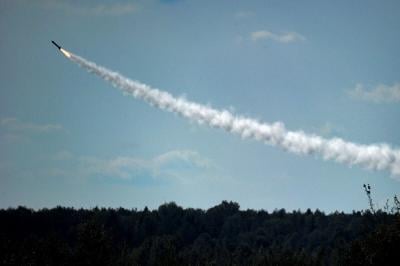OTTAWAŌĆöPrime Minister Justin Trudeau has cracked open the door to joining the U.S. ballistic missile defence program, reversing CanadaŌĆÖs long-standing opposition in the face of North KoreaŌĆÖs new capabilities to strike North America.
Trudeau said Tuesday that North KoreaŌĆÖs ŌĆ£reckless behaviourŌĆØ is a threat to global peace. For months, North Korean President Kim Jong Un has conducted weapons tests that show increasing capabilities by the isolated nation.
However, Trudeau declined to comment directly on U.S. President Donald TrumpŌĆÖs threat at the United Nations that America would ŌĆ£totally destroyŌĆØ North Korea if it continues its development of nuclear weapons and missiles.
ŌĆ£I share everyoneŌĆÖs concern over the reckless behaviour by the North Korean regime, and continue to believe that working with partners and allies in the region and around the world . . . is the best way to de-escalate this situation,ŌĆØ the prime minister told a news conference.
ŌĆ£As for what the president may have said, I look forward to seeing his speech myself.ŌĆØ
Recent testing by North Korea has revealed its ability to strike parts of North America with a missile, possibly one equipped with a nuclear warhead. That capability has restarted debate whether Canada should reverse its long-held position and join the U.S. missile defence program, designed to use land-based missiles to intercept incoming missiles.
Trudeau, who just last month said longstanding Liberal opposition to missile defence wouldnŌĆÖt change ŌĆ£any time soon,ŌĆØ appeared more open. On Tuesday he said his Liberal government has not changed its position ŌĆ£for the time being.ŌĆØ
ŌĆ£WeŌĆÖre continuing to look at the situation,ŌĆØ he said.
ŌĆ£We have not changed our position at this point, but we continue to engage in thoughtful ways to ensure weŌĆÖre doing everything we can and we must do to keep Canadians safe,ŌĆØ the prime minister said.
Lt.-Gen. Pierre St-Amand, the Canadian officer who serves as deputy commander of NORAD, the North American Aerospace Defense Command, pointedly warned that the U.S. is under no obligation to defend Canada against an incoming missile.
ŌĆ£WeŌĆÖre being told . . . that the extant U.S. policy is not to defend Canada,ŌĆØ St-Amand told a parliamentary committee last week.
Paul MartinŌĆÖs minority Liberal government in 2005 ended negotiations to join the controversial continental ballistic missile defence plan despite pressure from the U.S. administration of George W. Bush to sign on to the shield, a decision that pleased a big chunk of the Liberal caucus and voting base, but angered Americans.
ŌĆ£We simply cannot understand why Canada would in effect give up its sovereignty, its seat at the table, to decide what to do about a missile that might be headed towards Canada. It’s very perplexing to us,ŌĆØ Paul Cellucci, then U.S. ambassador to Canada, said at the time.
ŌĆ£There’s a lot of terrorism threats directed towards the United States ... You don’t have to miss by much to have a missile headed towards Canada,ŌĆØ Cellucci said.
Government briefing notes later by the Star revealed that bureaucrats were ready to make a strong case for Canada’s participation.
While the government favoured diplomacy and disarmament to curb the missile threat, defensive measures were seen as a ŌĆ£prudent complementŌĆØ to protect against ŌĆ£ongoing proliferation,ŌĆØ the notes said.
Since 2005, committees of the senate and the House of Commons have urged the federal government to reconsider its stance.
And the chorus of Liberal voices in support of joining missile defence has grown, including Liberal MP Mark Gerretson (Kingston and the Islands), a member of the defence committee; former Liberal parliamentary secretary of defence John McKay (Scarborough-Guildwood); former Liberal defence ministers Bill Graham and David Pratt; and retired general and Liberal-appointed senator Romeo Dallaire.
The Liberal governmentŌĆÖs new defence policy unveiled last spring committed the government to examining ŌĆ£through NORAD modernization, territorial defence against all perils, including threats from cruise missiles, ballistic missiles, and other future technologies to provide Canadians with greater security at home,ŌĆØ in the words of Defence Minister Harjit SajjanŌĆÖs spokesperson Jordan Owens.
Canada and the U.S. jointly monitor maritime and air approaches to North America through NORAD.
Under an August 2004 amendment to its mission, Canadians at NORAD headquarters can interpret U.S. satellite and radar data about incoming missiles and transfer it to officials at the missile defence system, the United States Northern Command.
That means Canadians could track an incoming missile but be left on the sidelines during the discussion about how to respond.
With files from Tonda MacCharles




























To join the conversation set a first and last name in your user profile.
Sign in or register for free to join the Conversation